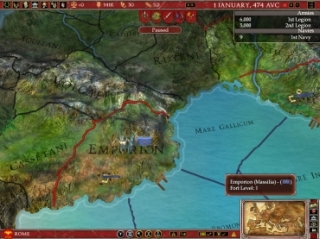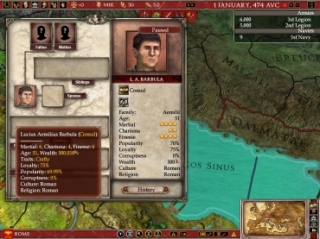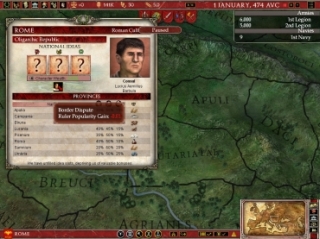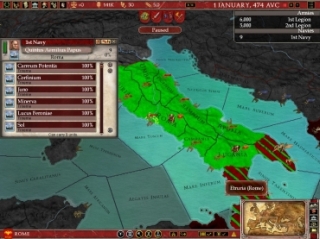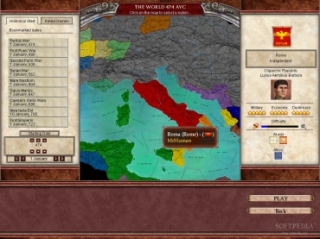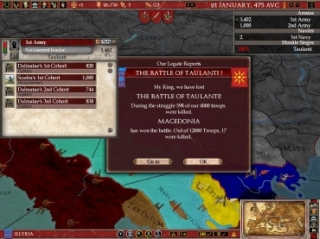I really, really wanted to love Europa Universalis: Rome. I've been playing Paradox grand strategy games since the time that Europa Universalis II didn't even have any worthwhile mods, trying to get Moldavia and Wallachia out of the Ottoman yoke. I've then tried my hand at building a Right wing world empire in Hearts of Iron II and I witnessed the release of two expansions, Doomsday and Armageddon and several mods that make the game a must have for all strategy inclined gamers. I even tried to relive the greatness of the British Empire in Victoria and its sequel Victoria Revolutions, even though the micromanagement got to me eventually. And I must confess that my time with Crusader Kings was short because I was really overwhelmed by the sheer number of connections, titles and possibilities. But I've been secretly talking to myself about giving that one another go, sometime.
And as my Europa Universalis: Napoleon's Ambition review shows, I've tried my hand at European domination with Austria, Brandenburg and Bavaria quite a few times, with mixed results varying from taking on the Ottoman and kicking their collective asses down to the Bosporus to getting entangled in Imperial politics to the point where I was reduced to a backward duchy no one even wanted to conquer (and if you haven't already tried out the Magna Mundi Gold mod, it really re-shapes the game into something much deeper; Magna Mundi Gold 2 drops on April 25).
Furthermore, I wanted Rome to be great because of the deep love I have for all things that happened before 0 AD. I nurtured this love with Caesar and Age of Empires and then it blossomed when Rome: Total War arrived, making it possible for the extraordinary effort that is Europa Barbarorum to exist. Europa Universalis: Rome seemed like the perfect grand strategy title with a deep diplomacy, internal micro-management of the empire and interesting character interaction that could complement the army movement and battle oriented Rome: Total War.
Alas, Rome has disappointed me a bit. It's not yet great. Good it is, but greatness eludes it like it eluded Pyrrhus of Epirus. Yet, with a couple of well placed patches (Paradox are renowned for their extremely good patch record) and with a few well designed mods (Paradox created games are notorious for being very mod friendly), we might still see the glory of Europa Universalis: Rome.
ConceptThe drill is pretty similar to other grand strategy games by Paradox, like Europa Universalis III. You are the power behind the throne of the country you choose. You get to do everything needed to make your nation (or kingdom or tribe as nations really weren't all the rage during the time period) the most powerful in the known world. Of course, because we are talking about an open ended, sandbox kinda game the goal can be everything you want it to be. If you play as Armenia you might set the goal of surviving the Seleucids for 100 years (which, in my experience, can get pretty tough pretty quick) while as mighty Rome you might set yourself the task of colonizing all that the real life Roman Empire colonized. Part of the fun and replay value of the game is the fact that you can build your own narrative, without being limited or overruled by the game.
The time setting takes you from 474 AUC to 727 AUC (AUC stands for Ab Urbe Condita and signifies the years as counted from the initial foundation of the city of Rome by one Remus and one Romulus, generally taken to be in 753 BC) which means that the game goes from the days when the Roman Republic was still struggling to get a foothold in Southern Italy all the way to the final years of the Republic. As with previous title Europa Universalis III there's no historical determination per se in the game. Everything is up to the player and no events will limit the freedom to choose what you think works in the context of the game.
The game is not turn based, but the player has the liberty to stop the flow of time at any given time with the pause button and the speed of the game can be quickly varied to go through the more uneventful periods at a higher pace. In Rome, you're going to use the full speed more often.
GameplayOn paper, Rome was set to be the be all, end all of Classic grand strategy. Yet the game, while creating an enjoyable and interesting simulation of the Ancient Europe, has several failings related to the mechanics employed.
The good news is that much of the tedium involved with playing Europa Univeralis III is now gone. No more Centers of Trade and sending of merchants. Now each province has a specific trade good and a number of trade routes. Pairing provinces is all that it takes to create trade routes, which now also have the advantage of creating civilization in barbarian provinces. Trade income is also one of the main sources of cash in the game, so it really pays to get some trades going as soon as possible.
The religion aspect is also nicely simulated with the addition of omens. Although more factional specificity would have been nice (maybe an Oracle for the Hellenic factions could have been introduced) it allows the player to try and summon a sign from the Gods each year. If the omen is positive then the player gets a bonus, if not a malus in various areas, from defense rating to research.
Speaking of research, the technology side has also been tweaked. You no longer divert money into each research area and expect results. Micromanaging is long gone. Now a character oversees each area and all the citizens in your faction contribute yearly to research. The only gripe is that, with patch 1.1 applied, research slows down to a crawl. Paradox has promised a bug fix as soon as possible.
The importance of characters is bigger in Rome than in previous games. Each governor, ambassador, research overseer or general is also a simulated character in the game. Each can gain traits and develop its abilities. As the game progresses, rivalries and friendships will develop and you might find yourself needing to dispose of certain generals so as to avoid civil war. A nice mechanic the fact that a successful general with high ratings can get the troops we command to become loyal to him, rather than the state. If you see such popular figures take them out of command and let them live out their lives as governors in some backwater province, because otherwise you'll have a revolt to deal with.
One of the less than adequate mechanics is that of colonization. At the beginning of the game, most of the map is covered in barbarian provinces, which don't have a form of government. To colonize them, you need to increase their civilization rating, by trading with them and having provinces that border them and then defeat the barbarians living there. The problem is that the AI seems to cheat when colonizing while the players need to wait for the civilization value to rise, which means that you can end up with a mighty Macedon that in 30 years has reached the steppes of Poland while a player controlled Rome hasn't even subdued the Alps. Another issue with the colonization system is that it makes it very tough for less civilized factions, like the Suebi or the various Gallic tribes, to expand.
Combat is another cause for frustration. The issue here is that armies suffer relatively low casualties and that battles are rather short. This means that you will likely fight the same enemy army up to ten times to destroy it. Even worse is than retreat rules allow an enemy army to retreat towards the heartland of your nation, which you might have left un-garrisoned to secure the front lines. If a barbarian army is defeated on the front lines you might be surprised to see it retreating towards Rome itself, which it might proceed to capture and plunder, rather than back towards the Alps. Again the issues is looked at by Paradox but the ping-pong battles, as users have nicknamed them, really detract from the overall experience as you spend more time chasing enemies down that fighting them mano a mano.
Another problem is that the game is very much Rome centered. Factions like Carthage, the Seleucids, Egypt or Macedonia also make for good gameplay challenges, but life as a one province minor is very hard, whereas in Europa Universalis III you could have copious amounts of fun playing as one province trading powerhouse like Hanover. On the bright side the amount of stuff that you have to do as a major nation is enough to keep any player occupied for many hours.
Visuals and soundParadox has never made a big show out of the visual presentation of its games. The graphics in Rome are adequate without being flashy. The 3D modeled terrain and armies look good, although the player spends more time in the political, diplomatic and trade map modes, where the graphics offer information and are visually lackluster.
The interface itself is as streamlined as possible, resulting in the best accessibility of all Paradox games. Even if you're new to the games you shouldn't need more than half and hour to get your bearing straight. A panel on the right offers info about armies and fleets, the top buttons on the left let you manage the most important aspects of your political entity, meaning characters, military, economy, trade, religion and government. Clicking on a province or army let's you view them and perform actions, like changing the general or governor that's in charge. Down by the bottom of the screen you'll find the ledger, where you can compare aspects of nations and provinces, and also the menus for recruitment and building for all provinces. Hovering with your mouse will most likely than not bring out tool tips that offer additional information and advice.
The sounds are also functional with the musical score deserving a bit of praise for creating a sense of glory and intrigue that's very well suited for the period. It can get repetitive, especially if you put in a lot of hours at a time. I've found that searching online for recreations of ancient Roman and Greek music nets you a lot of tracks that blend in perfectly with the setting of Rome.
Multiplayer
Paradox says that both competitive and co-op multiplayer games with up to 32 players in them are a possibility. However, because only major nations have a chance at winning the game and the resources needed for this multiplayer matches are more subdued affairs, with 2 to 6 players usually. The multiplayer support is solid and as more people get the game the number of matches will surely increase. As always it pays to head over to the official forums and see if anyone is up for a game.
Conclusion
Rome is a yet unshaped gem. Combat needs tweaking as does colonization, but the game is, as usual for Paradox, a deep and engaging grand strategy title. Play as Rome to get the hang of it, experience some civil wars, colonize Gaul and then take on Epirus or Carthage for some added challenge. Dealing with barbarians, other empires and the will of the Gods while seeing generals rise up and then disappear under your eyes really makes for a good game. I really hope that the people from Paradox are reading the official forums and the game reviews and are planning to address those issues that keep Rome from being the game it was supposed to be.
Give Rome a chance now and if it lets you down don't forget to pick it up again once a few patches and a few mods come around to reshape it.
 14 DAY TRIAL //
14 DAY TRIAL // 
